There are many excellent books available for people interested in preparing for a variety of unexpected events. One thing to consider. If you purchase electronic versions of these books, consider that, in an actual emergency, the power grid is most likely one of the first to go down. How would you power your electronic device to reference these books long term? Hard copy may be a good choice considering the realities. Note that all cover photos are "Hot", click on a cover and it will take you to the Amazon page for that particular book.
The following list of books is a representative sample of the books available on this topic. I have only included the top rated publications that have been recently published. The Survivalist Magazine is quite good. It is published monthly and covers a wide range of topics of contemporary interest.
The following list of books is a representative sample of the books available on this topic. I have only included the top rated publications that have been recently published. The Survivalist Magazine is quite good. It is published monthly and covers a wide range of topics of contemporary interest.

Meds to Stockpile For a Crisis
From pharmaceutical medicine to vitamins, antiseptics and additional herbal medicines, there are a number of important medical supplies that you can and should stock up on in case of an emergency. Over-the-counter medications are a good place to start, including antiseptic, antibacterial and antifungal medicines. If you know where you purchase them, you can also stock up on basic antibiotics legally and without a prescription. First and foremost, I always like to mention that if you or anyone in your family has a life-threatening dependence on a certain prescription medicine, you really should be sure to stock as much of that medication as possible. Most medications, when stored properly, will keep for anywhere from several months to several years. Find out what the shelf-life is of your medications, and try to keep at least a 3 month supply of crucial medications in stock. Pain medication is another big one on the list of medicines that you should stock up on. Include a variety of different pain medications, such as aspirin, acetaminophen, ibuprofen and even opiate-based pain medication if you have legal access to it or a prescription. Not only is pain medication important for you and your family, but it has immense inherent value and can therefore be traded or bartered with as needed. Keep in mind that ibuprofen and acetaminophen can also be used to reduce fevers, though both can be harmful in large doses or over an extended period of use. On the more natural end of the spectrum, a potent extract of curcumin, one of the active components in turmeric, has been used traditionally to relieve arthritic pains. Some studies have shown curcumin to demonstrate similar levels of efficacy as someprescription NSAIDs. For topical pain relief and as a mild anesthetic, you can store oil extracts of clove, wintergreen, and many hot peppers, including cayenne, for their pain-relieving qualities. Clove oil is purported to be especially effective when it comes to toothaches, while hot peppers can be used to make oils or lotions for application to topical aches or tight muscles.Burn gel containing a percentage of lidocaine can also come in handy, even if you don’t necessarily have a burn to treat. Lidocaine is an anesthetic, usually included in concentrations of 2% – 4% in gels that are available OTC. Other medicine that can be purchased OTC includeImodium, for treating and preventing severe diarrhea, as well as Benadryl or another antihistamine suitable for helping to contain an allergic reaction.Be aware, antihistamines and OTC pain medication such as acetaminophen can cross-react with one another; many ‘nighttime’ OTC pain medications include a small dose of antihistamine along with 250mg or 500mg of the regular pain medication. Cold medicine such as DayQuil or NyQuil can also be helpful, especially if you have young children who do not handle swallowing pills well. Liquid cold medicines generally have a decent shelf-life, and can be helpful for reducing fever, relieving nausea, relieving pain or stomach upset, and as an aid for getting to sleep.An OTC supplement called melatonin can also be useful in regulating sleep and encouraging a natural sleep cycle. In a post-SHTF scenario, you can bet good money that a lot of people will die of secondary infections and basically for a lack of antibiotics.Fortunately, antibiotics can also be stockpiled, legally, without a prescription and generally rather affordably. Simply check at your local farm supply store or vet, and ask for antibiotics such as FishMox or FishPen, they are amoxicillin and penicillin, respectively. Antibiotics should be used sparingly, but there are times when a course of antibiotics can mean the difference between life and death. Many, many plants have natural antibacterial, antibiotic and antiviral properties as well. Aloe vera has a long history of use as a soothing balm for burns, to rejuvenate damaged skin, and also as an antiseptic gel for topical use. Some hospitals have taken to using allicin and alliin, two compounds found in fresh, crushed garlic, to fight antibiotic-resistant diseases like MRSA. Another great natural antibacterial and antiviral is tea tree oil, the oil of the melaleuca tree, which has also been used in some hospitals and clinics to fight antibiotic resistant diseases. In addition to pharmaceutical and natural or herbal medicines, there are a number of vital nutrients that you can stock up on to promote, support and maintain the best health possible. Start with basic, fundamental nutrients like essential fatty acids (EFAs), a high quality multivitamin, and a 2000IU or 5000IU dosage of vitamin D3. Vitamin D3 is one particular medicine / supplement that is quite affordable and can serve to boost the immune system significantly. Remember to maintain a sanitary environment as much as possible, and stock up on rubbing alcohol, hydrogen peroxide and liquid iodine for use as topical antiseptics and cleaners. If you have pets like a dog or a cat, or if you have very young children, keep in mind that a small amount of hydrogen peroxide, when swallowed, will induce stomach upset and vomiting. Some people also keep ipecac syrup on hand for inducing vomiting. You can also store hydrocortisone cream to help treat skin ailments or eczema, it can provide quite a lot of relief. Use hydrocortisone cream on rashes, itching bug bites, or other minor, irritating skin problems and relish the relief it brings. I also recommend a good stock of antifungal cream to treat any ringworm or athlete’s foot that may crop up. Finally, if you have access to quality honey and can store it properly, honey has an incredibly long shelf-life and many potential health benefits. Ranging from anti-inflammatory properties to antibiotic and antifungal, honey is a natural powerhouse of veritable goodness and health-promoting compounds. You can use honey in a variety of herbal teas to stave off colds and flu, or apply it topically over a wound to take advantage of its antiseptic and antibacterial properties. The Prepper's Pocket Guide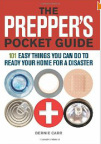
BE PREPARED
BE SAFE Publication Date: July 12, 2011 From California earthquakes and Rocky Mountain wildfires to Midwest floods and Atlantic hurricanes, you can’t escape that inevitable day when catastrophe strikes your home town — but you can be prepared! Offering a simple DIY approach, this book breaks down the vital steps you should take into 101 quick, smart and inexpensive projects. Rated 4.3/5 Poverty Prepping
A lot of people think they don't have enough money to store extra food for emergencies. It's a struggle just to make ends meet and afford what they need right now. I think anyone can start to prepare for the future.
My husband and I have a 4-figure annual income that isn't even close to hitting five figures. If we can do it, you can too. We're not just telling you how to do it, we're living it! Don't be put off by books, websites, and forums that lead you to think you have to buy expensive pre-packaged food storage, or foods that you're not familiar with. Stocking up doesn't have to be expensive or complicated. You can get started with just a few dollars a month. Rating 4.3/5 Sheltered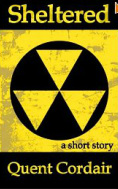
Publication Date: April 13, 2012
"A year and six days underground without sunlight or breeze or contact with the world above--whatever might be left of the world above. A year and six days without touch, without unrecorded voice, without contact, without friends or family. If only they had listened, if only they had been ready. But he--he had prepared. He was Reginald B. Wakefield, and he hadn't died. A wave of vindication washed over him, lifting and sweeping away all doubt and fear. He had been right. He raised his eyes again to the hatch cover above. . . . He had been right." In Sheltered, the timely short story by Quent Cordair, one man follows his own course in response to growing fears of impending disaster and societal breakdown. Rating 4.3/5 Every Step in Canning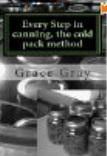
Publication Date: September 30, 2011
The knowledge that our Grandparents, and Great Grandparents knew in their everyday lives, can be a great asset for our use in these ever more difficult economic times. Goat Hollow Press is pleased to make Every step in canning, the cold pack method available to a new generation of home canners! Rating 4/5 Survivalist Magazine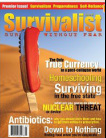
Publication Date: February 29, 2012
Special Premier Issue Reprint Features: The Only True Currency in a Post-Collapse World, Surviving in the Free State, Down to Nothing: Finding Food When You're Desperate, On Survivalism - Preparedness - and Self-Reliance, Homeschooling: A Family Matter, What Are You Gonna Do About a Nuclear Threat or Device, Antibiotics: Why You Should Store Them and How to Get Them Without a Prescription, Lone Wolf Syndrome, plus Book Review: American Apocalypse; The Beginning, and more! Rating 4/5 A Preppers View of Societal Collapse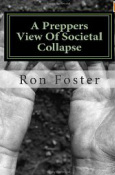
Publication Date: August 29, 2011
Set in a post apocalyptic America just after a solar storm destroyed the grid and most technology finds the hero David, of the original book Preppers Road March, trying to create a sustainable life at his bug out location. I was contacted by a number of readers who wanted to inquire about what had happened to their favorite characters who first appeared in the Prepper Trilogies. I undertook the task of answering this, as a thank you to my dedicated readers, by beginning a series of Prepper Novelettes so that the characters could give voice to their own experiences from their differing personal perspectives. These are short little updating features that give my readers 'the rest of the story' that popular demand has requested. This is the third book in the series. David and his fellow refugees who bugged out to the lake continue the struggle for everyday existence as they must range farther abroad on their "borrowing" trips for supplies. Boudreaux and Bernie have gotten the Trading Post up and running and are finding innovative ways to keep it stocked as well as guarded against a populace growing more desperate everyday. The novelletes are written utilizing southern style language and grammer. Rating 5/5 US Army Survival Manuals
|
The Prepper's Handbook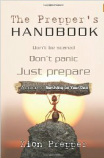
The End of the World As We Know It (TEOTWAWKI). A World without Rule or Law (WROL). This is what Preppers prepare for. Bug-out Vehicle (BOV), Bug-out Bag (BOB), Bug-out Location (BOL), Bug-out Directions (BOD). This is the language of the Prepper. This handbook will provide individuals, families, or groups access to the unique mindset of those survivalists called Preppers. Preppers prepare for unknown circumstances, such as economic collapse, natural events, manmade catastrophes, and even the end of the world. Preppers come from all walks of life, ranging from blue-collar workers to white-collar executives running multimillion-dollar companies. The reality is that we’re all Preppers in one way or another. Rated 5/5
Preppers Road March
A solar storm has just hit the world causing a EMP event. A emergency manager visiting Atlanta GA must find his way back home after this electromagnetic pulse has stranded him away from his vehicle and his beloved "bug out bag". With 180 miles to go to his destination, David must let his street smarts and survival skills kick in as food and water becomes scarce and societal breakdown proceeds at an unrelenting pace. An interesting and often funny cast of characters from the Deep South helps the displaced Prepper on his way, as he shares his knowledge of how to make do with common items in order to live another day. Ultimately, he acquires an old tractor and heads for home on a car-littered interstate. This is book one of the Prepper Trilogy. Rating 3.5/5
The Covert Prepper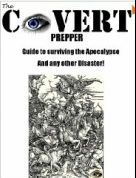
Publication Date: June 12, 2011
Disaster, the one few things that affect all people regardless of race, color, creed, and income, can happen at any time without warning. This book is designed to help you prepare for a disaster and if you prepare for disasters, when the Apocalypse happens you will be miles ahead of everyone else. Learn from James Smith, The Covert Prepper, his tips, tricks, and techniques on how to keep you, your family, and your property safe. Under no circumstance should you use any information provided for criminal activity. If the end of our civilization is upon us, then wait until it happens before you do anything possibly illegal. Given that at any point in time a natural disaster can and will occur when you least expect it, it is best to prepare now, not later. Imagine your frustration when you WERE going to prepare and you now need to get through weeks if not months of clean up and finding food. Now imagine how your family will feel when they are hungry, thirsty, wet, and cold. Learn how to hide food and water in plain sight! Learn how to communicate securely in a restrictive environment. Learn what you must do to make your home safe from invasive zombies, FEMA thugs, or looters Learn what it takes to protect a small town during a collapse, and how to make it prosper in the worst of scenarios A disaster may happen, but it doesn't mean it's the end of the world! You could ignore his advice. But are you willing to pay the cost? Rating 5/5 Disaster Preparedness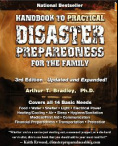
Publication Date: May 2, 2012 Edition: 3
This handbook will help you to establish a practical disaster preparedness plan for your entire family. The 3RD EDITION has been expanded to cover every important topic, including food storage, water purification, home improvements, electricity generation, backup heating, firearm selection and handling, communication systems, disaster preparedness networks, evacuations, life-saving first aid, and much more. Working through the steps identified in this book will prepare your family for nearly any disaster, whether it be natural disasters making the news daily (e.g., earthquakes, tornadoes, hurricanes, floods, and tsunamis), or high-impact global events, such as electromagnetic pulse attacks, radiological emergencies, solar storms, or our country’s impending financial collapse. The new larger 8" x 10" format includes easy-to-copy worksheets to help organize your family's preparedness plans. Additional information is also presented for the elderly, those with children, people with disabilities, pregnant women, and pet owners. Every topic is well researched with over 300 references cited. Rating 4.4/5 Holding Your Ground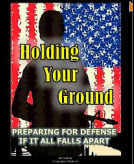
Publication Date: June 6, 2011 HOLDING YOUR GROUND is an instructional guide and planning tool that addresses defensive preparation of a location. If the government can no longer protect your home, farm or property, HOLDING will teach you how. HOLDING covers virtually every aspect of protecting you and your family in the event society breaks down. Many people have preparations for food, water, shelter and personal defense. HOLDING will teach you how to configure your home, train your team, and properly equip any location for defense. Covering topics ranging from hiding in plain sight to pre-positioning of supplies, HOLDING uses common sense, military tactics and historical examples that allow you to prepare for defense without affecting your property's value or appearance. Rating 4/5
Confessions of a Prepper
Publication Date: May 18, 2012
This is a short informative article to help beginning preppers learn how to start out their preps. It has useful designs for solar food dehydrators, and methods for storing and buying preps. This article is designed with a limited budget, and space in mind. Every prepper starts somewhere, this is an accumulation of the things I have learned through trial and error. Unrated Prepper's Instruction Manual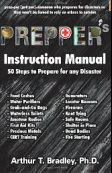
Publication Date: July 2, 2012
If your community was hit with a major disaster, such as an earthquake, flood, hurricane, or radiological release, how would you handle it? Would you be forced to fall into line with hundreds of thousands of others who are so woefully unprepared? Or do you possess the knowledge and supplies to adapt and survive? Do you have a carefully stocked pantry, a method to retrieve and purify water, a source for generating electricity, and the means to protect your family from desperate criminals? In short, are you a prepper? This book contains fifty of the most important steps that individuals and families can take to prepare for a wide range of disasters. Each step is complete, clearly described, and actionable. Together, they cover every aspect of disaster preparedness, including assessing the threats, making a plan, storing food, shoring up your home, administering first aid, creating a safe room, gathering important papers, learning to shoot, generating electricity, keeping warm, and much more. Recent events have reminded us that our world is a dangerous place, whether it is a deadly tsunami, a nuclear meltdown, or a stock market collapse. Our lifestyle and even our very existence is forever uncertain. Join the quickly growing community of individuals and families determined to stand ready. Become a prepper! Rating 5/5 Bug Out! Preppers on the Move!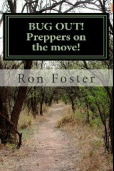
Publication Date: June 25, 2011
Book two of the Prepper trilogy finds the disaster planner and emergency manager Dave faced with the choice of bugging out with his cohort of freinds and family as he watches the societal collapse and demise of civilization around him after a electromagnetic pulse (EMP) solar storm has taken out the grid. A post apocalyptic fiction series that takes you through the trials and tribulations of survival after the predicted Nasa 2012 solar super storm unravels the lives and lifestyles of a group of modern day survivalists. The preppers descide on a lake front bug out with bags in hand as well as a unique group of operating vehicles from a bobcat loader to a lawn tractor.Will they survive? Could you? Let us find out, and join the party down the desolate dystopian landscape of a new begining in a world without lights or technology. Rating 3,6/5 Without Rule of Law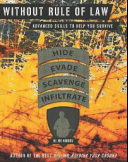
Publication Date: January 19, 2012
WARNING: This book contains material that may be offensive to some readers. It is an instructional guide covering tactical actions and capabilities which should only be executed in last-resort survival situations. This book was written for non-military readers who believe in self-reliance and wish to develop advanced, just-in-case capabilities for themselves and their families. It leads the reader through progressively more complex preparations and activities. Written by Joe Nobody, author of the bestselling HOLDING YOUR GROUND series of books, this work addresses skills that may be necessary to survive if a breakdown of society or government should occur. The work covers topics such as camouflage, breaching, hiding, stalking, looting, scavenging, infiltration and disguise. The book includes numerous examples, special equipment, exercises and instructional text on how to plan, equip and execute these actions in a potentially hostile, post-SHTF environment. It takes the reader through various scenarios and provides guidance should TEOTWAWKI occur and extreme measures are required to survive. Rating 4/5 |
DISCLAIMER: This information is only supplied as references and a starting point only .. Suppliers or sites not to be considered as any type of recommendations from The Villages Tea Party... Members must do their own research..